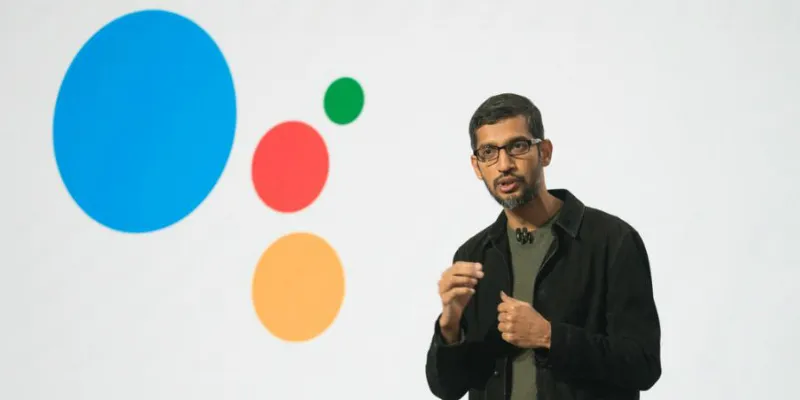How Google is going from mobile-first to AI-first while competition heats up
Google on Tuesday officially announced a major change in its strategy to go after the smartphone market, as the search giant unveiled a 'family of products' — Pixel, Daydream, Home, and WiFi — to venture into a new category of products which have both 'hardware and software made by Google'.
Taking the stage at the event, Sundar Pichai, CEO of Google, noted that when Google was founded in 1998, there were about 300 million people using the internet, the vast majority of whom were sitting at desktop computers and looking for answers that came in the form of blue links.

But today, the internet community is closer to three billion people, and users are searching for all kinds of help across different contexts and devices, from cars and your classrooms to homes and the phones in people's pockets. Sundar said,
When I look at where computing is heading, I see how machine learning and artificial intelligence are unlocking capabilities that were unthinkable only a few years ago. This means that the power of the software — the 'smarts' — really matter for hardware more than ever before.
From mobile-first to AI-first
Sundar believes the last 10 years were about building a mobile-first world, turning smartphones into remote controls for our lives. But in the next 10 years, the shift will be towards a world that is AI-first, a world where computing becomes universally available — be it at home, at work, in the car, or on the go — and interacting with all of these surfaces becomes much more natural, intuitive, and intelligent. Sundar said,
This is why we built the Google Assistant, which allows you to have a natural conversation between you and Google.
The first instance of Assistant appeared in the recently launched smart messaging app Google Allo. But Google believes this is only the beginning for AI. Sundar envisioned a world where AI would be able to help users get a lot of things done in their world across different places, contexts, and situations. This is where Google's 'family of products' and other moonshot ideas under Google X like self-driving cars may come into the picture.
The global AI revolution
Alphabet Inc., Google's parent company, has been heavily investing in moonshot projects and in its quarterly earnings report noted that it spent nearly $1 billion on 'other bets'. But Google is not alone in its quest for AI dominance. Other tech giants and legacy players too have been investing resources into developing their machine learning and AI capabilities.
Amazon
Amazon recently launched Amazon Echo, a voice-activated smart home speaker, and also has a machine learning initiative under its cash-cow Amazon Web services. Both these initiatives make heavy use of AI and machine learning. Amazon Founder and CEO, Jeff Bezos considers AI to be in its early stages of a decade-long trend.
While Mark Zuckerberg's most recent focus has been on curing diseases through the Chan Zuckerberg Foundation, Facebook has been investing heavily in artificial intelligence through a range of open-source AI projects and also improving image recognition features of photos uploaded on Facebook.
Facebook also has an AI wing — Facebook AI Research (FAIR) — that aims to leverage machine intelligence and develop technologies to give people better ways to communicate.
Microsoft
Microsoft may have lost the 'smartphone wars' to Google and Apple but is looking to ride the AI wave. Microsoft's machine learning capabilities include their Azure cloud but under CEO Satya Nadella's leadership the company recently announced the launch of a new division to focus on AI. The new division includes the company’s Information Platform Group, Bing and Cortana product groups, and ambient computing and robotics teams, which takes the total headcount to 5,000 computer scientists and engineers.
IBM
Unlike other recent entrants, IBM has been in the AI space since the 1950s. Arthur Samuel developed a checkers player that learned from experience, which is considered to be the earliest and most influential examples of machine learning. 40 years later, IBM Research's chess-playing program Deep Blue made history when it beat Gary Kasparov. More recently, IBM's Watson has been at the forefront for its progress in AI and machine learning.
OpenAI
While a lot of global tech giants are rapidly advancing to develop their AI capabilities, OpenAI, a non-profit artificial intelligence(AI) research company is not equally optimistic about the future of AI. OpenAI's co-chairs include Sam Altman (CEO of startup incubator Y Combinator) and Elon Musk (CEO of SpaceX, Tesla) with former CTO of Stripe Greg Brockman heading the tech team. Pieter Abbeel, Yoshua Bengio, Alan Kay, Sergey Levine, and Vishal Sikka are advisors to the group.
The goal of the organisation is to “advance digital intelligence in the way that is most likely to benefit humanity as a whole, unconstrained by a need to generate financial return.”
As we move from a mobile-first to an AI-first world, which company do you think has the most potential to create a lasting impact?
Related read: How AI is about to disrupt the relationship economy







